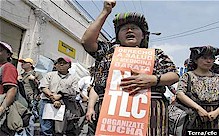Guatemala: Between the sword and impotence
Granma International, Havana, April 26, 2006
GUATEMALA: Between the sword and impotence
BY NIDIA DIAZ
Granma International staff writer
AS during the crudest times of interventionism in banana republics, James Derham, U.S. proconsul in Guatemala, snuck into a session of Congress on April 18 to pressure legislators to approve — now! — a complimentary law being demanded by the United States so that the country definitely enters into a Free Trade Agreement.
Between the sword and impotence

In 2005, the United States, Central American nations, and the Dominican Republic signed a Free Trade Agreement (FTA) which was set to go into effect January 1, but has been blocked by the failure to pass legislation that would protect this new form of domination involved in those types of agreements.
To date, only El Salvador, Honduras and Nicaragua have given their approval, changing their national laws. The Costa Rican Congress has not yet ratified the FTA and in Guatemala, the legislature is debating between the trick of making them wait and not appearing as servile to the master, or — before destroying their inheritance — snatching at least a few modifications so as not to affect the social aspect to quite such an extent.
Nevertheless, the yankee representative needed just a few minutes for Jorge Méndez Herbruger, president of the Guatemalan Congress, to address his colleagues with a request: "We are aware that there are insufficient votes, but I would like to ask the bloc leaders to be aware of the importance of the law (which the United States is forcing us to approve) in order for the FTA to go into effect on May 1."
In order to do so, Congress must agree to the modification of some 15 laws, just as Washington is demanding. These include the current Penal Code, the Trade Law, the Transactions Law, and Tax Law; those related to fiscal stamps, financial products, and banks; and those affecting telecommunications, industrial property, intellectual property rights and environmental protection.
These are modifications to the detriment of the country’s sovereignty and the few labor and civil rights that the Guatemalan people still have.
Meanwhile, according to an AP report, Guatemalan President Oscar Berger stated a few days before Derham’s visit to the Capitol: "They want to drive us into situations that we cannot permit. We have national laws that we must respect, that we cannot change from one day to another because of a trade agreement; moreover, it is a situation that United States is aware of."
It is worth asking whether or not President Oscar Berger knew that by signing the FTA with Washington, he was handing over the country’s sovereignty, and tying his own hands as the head of the executive branch.
It would have been naïve on his part if he didn’t even question how Guatemala would be affected after the signing of the agreement.
The delay in approving complementary legislation demanded by the empire is stalled for reasons that include a lack of consensus for giving the green light to compensatory social measures so that once the FTA goes into effect, the most vulnerable sectors of the population will not be affected. We’re talking about 70% of the 12 million Guatemalans who live in poverty.
In the midst of this gross and interventionist push, the government is debating impotently, in contrast with the resolute determination of campesinos, indigenous peoples, workers and human rights activists who have set forth a list of demands, convening a peaceful national uprising that included roadblocks.
The just and unanswered demands are for the resolution to more than 1,000 agrarian conflicts; a halt to evictions; cancellation of the debts of hundreds of campesino families; a rural development law; an end to mining concessions for foreign companies; higher wages in diverse sectors, and the suspension of a supposed education reform that could lead that sector to privatization.
The protests have been organized by powerful organizations, such as Union and People’s Action United (UASP), which brings together 276 unions and grass-roots groups; the National Indigenous and Campesino Coordinating Committee; the National Educators Assembly, and workers from the informal economy, whose precarious situation is desperate.
It is also notable that rejection of the FTA was at the center of their protests.
Of course, the protests left a total of 28 arrests and four campesinos injured as a consequence of combined actions by the Army and police, who used tear gas against the demonstrators.
Making the country ungovernable could be one of the consequences that comes with this determination of the people, which is why Vice President Eduardo Stein, representing the government, held talks for nine hours with protest organizers, and they reached an agreement which, according to Juan Tiney, leader of the National Indigenous and Campesino Coordinating Committee, was "satisfactory, with the most important result being the constitution of a table for dialogue with decision-making abilities, that includes the three powers of the State: the executive, the legislative and the judicial."
The most pressing demands are for the Agreement on Indigenous Identity and Rights, which proposes access to the land, health and education, as well as the issue of agrarian conflicts and the reactivation of small producers.
The vice president assured them that everyone who was arrested during the demonstrations would be freed.
Doubtless, it was a day of combat and victory, in which the government was obligated to listen to the demands of a people’s movement that has demonstrated it will not be deceived again.





